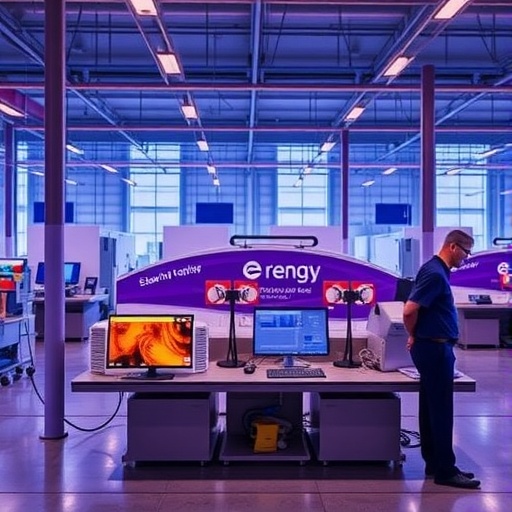In recent years, the push for sustainability has increasingly extended beyond consumer products to encompass the very foundations of production—the factory floor. The manufacturing sector has historically been a significant contributor to carbon emissions and environmental degradation. However, a groundbreaking study led by researchers including Leal Filho, Aina, and Gatto sheds light on innovative strategies aimed at greening factories, thereby considerably reducing their climate impact. This exploration signals a transformative shift in how industries perceive and implement sustainable practices within their operational frameworks.
The research presented highlights the urgent need for manufacturers to seriously reconsider their environmental footprints. As the global population grows and climate concerns escalate, industries are compelled to develop more sustainable, eco-friendly manufacturing methodologies. The findings from the study underscore the relevance of integrating sustainability into every aspect of manufacturing, from resource extraction to final product delivery. Through various advanced techniques and strategies, industries can minimize waste, enhance energy efficiency, and lower greenhouse gas emissions.
One of the pivotal innovations discussed in the study is the adoption of smart manufacturing technologies. These technologies incorporate IoT (Internet of Things) devices that collect and analyze data in real-time, allowing factories to optimize their processes. By leveraging data analytics, manufacturers can identify inefficiencies in their production lines and implement targeted changes that lead not only to higher efficiency but also to a significant reduction in material waste and energy consumption. As these technologies become more accessible, their implementation promises to revolutionize conventional manufacturing processes.
Another essential aspect of the research revolves around the concept of a circular economy. This approach emphasizes the importance of reusing materials and resources in the manufacturing sector. By transitioning from a linear model—where products are created, used, and discarded—to a circular model, manufacturers can drastically cut down on waste. The study showcases various case studies highlighting companies that have successfully implemented circular economy principles, envisioning a future where production and consumption cycles are sustainable and regenerative.
Moreover, the integration of renewable energy sources in the manufacturing process is addressed as a key factor in limiting climate impact. Utilizing solar, wind, and other renewable energy options not only reduces reliance on fossil fuels but also reflects a commitment to sustainable practices. The research provides compelling evidence that companies investing in renewable energy see significant long-term savings and enhanced stakeholder confidence, further driving the call for greener manufacturing solutions.
The authors also emphasize the critical role of employee engagement in driving sustainability across factory floors. Companies that actively involve their workforce in sustainability initiatives often witness enhanced productivity and morale. The study advocates for training programs and workshops centered on sustainability principles, encouraging workers to adopt eco-friendly practices. This cultural shift within companies can foster an environment where sustainability is viewed as a collective responsibility rather than merely an executive directive.
Further, the study underscores the necessity of eco-design in the development of manufacturing processes. By prioritizing sustainability at the design phase, companies can create products that are not only economically advantageous but also environmentally benign. Eco-design principles advocate for the consideration of the entire lifecycle of a product, from material selection to end-of-life disposal. This proactive approach enables manufacturers to anticipate potential environmental impacts and mitigate them before they arise.
Regulatory frameworks also play a vital role in steering the manufacturing sector towards sustainability. The researchers argue that clearer and more stringent regulations can incentivize manufacturers to adopt greener practices. By aligning regulations with sustainability goals, policymakers can effectively guide industries towards lower carbon footprints while fostering economic growth. The study suggests a collaborative approach between governments and industries to create more coherent policies supporting sustainable manufacturing.
Collaboration among different sectors is also crucial to achieving greener manufacturing. The study highlights examples where partnerships between manufacturers, suppliers, and researchers lead to innovative solutions that benefit all parties involved. Such collaborations can enhance resource sharing, knowledge transfer, and foster technological advancements that accelerate the transition to sustainable practices in manufacturing.
As the findings indicate, sustainability in manufacturing is not merely an ethical option; it is becoming increasingly essential for business viability. With consumers gaining awareness of environmental issues, companies must adapt to this changing landscape to maintain market competitiveness. Sustainability is evolving into a key differentiator that can attract customers and enhance brand loyalty in a saturated marketplace.
However, the transition towards greener manufacturing processes doesn’t come without challenges. The research acknowledges the financial implications of adopting new technologies and processes, which can be a barrier for many manufacturers, especially small to medium-sized enterprises. Despite these challenges, the long-term benefits, including reduced operational costs and enhanced market positioning, far outweigh initial investments.
Ultimately, the message conveyed through this remarkable study is clear: the time for action is now. The manufacturing sector stands at a crossroads, with the opportunity to redefine its legacy through innovative, sustainable practices. By embracing technology, rethinking production processes, and committing to eco-friendly initiatives, manufacturers can play a pivotal role in combating climate change and fostering a healthier planet for future generations.
As this research reaches the wider audience, it aims to inspire change across the industry, encouraging manufacturers to take definitive steps towards greening their operations. Collaboration, commitment, and innovation will be key in this endeavor, positioning the manufacturing sector as a leader in sustainability.
With the right mindset and tools, the manufacturing industry can transform from a major contributor to climate change into a powerful ally in the battle for a sustainable future.
Subject of Research:
Article Title:
Article References:
Leal Filho, W., Aina, Y.A., Gatto, A. et al. Greening the factory floor and reducing the climate impact of the manufacturing sector.
Discov Sustain 6, 1204 (2025). https://doi.org/10.1007/s43621-025-02056-1
Image Credits: AI Generated
DOI: https://doi.org/10.1007/s43621-025-02056-1
Keywords:




